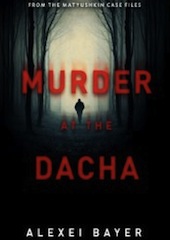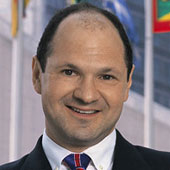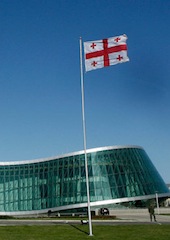The Russia Putin Grew Up In
A work of fiction, Murder at the Dacha, portrays a Russia of the past — and the present.
October 20, 2013

Editor’s note: The following is an excerpt from “Murder at the Dacha” (RIS, 2013), the new novel by The Globalist’s Contributing Editor Alexei Bayer.
One day, we were sitting around the dining table in Tosya’s room under an orange lampshade. “This is what I have found out,” Lenny told us. “At the Foreign Languages Institute, Lyuda Polishchuk used to have a classmate, a kid whose name was Senya Pavlov. A good student, he was particularly good in English. He was a minor member of the infamous Rokotov gang.”
“The Rokotov gang,” I explained to Tosya, “was what Daniel Frezin went to jail for the last time he got caught. The gang specialized in buying hard currency from foreigners, which is illegal, of course.”
“That Pavlov kid never bought any hard currency,” objected Urumov. “It was a complicated network and they had an extensive supply chain. It included the guys who bought currency in the street and reached up to the head of the operation, to Ian Rokotov. There were at least five layers between the street traders and the ultimate boss, and each layer knew only one person at the level above them.
“Lyuda claims that Pavlov knew Rokotov, that the two of them got to be acquaintances because they liked to listen to jazz. But Pavlov never even suspected that Rokotov was a head of a huge black market operation.
“Every once in a while, Rokotov would ask him for a favor. Innocuous stuff, like taking a useful foreigner to the Bolshoi ballet. Pavlov was a smart kid and he could chat with foreigners about lots of things in their own language.
“Everything was above board. No commercial transactions, no talk of buying currency. A few times, Pavlov even took Lyuda along. Eventually, of course, Pavlov figured out that he was doing something fishy, especially once Rokotov began paying him a salary for those outings.”
State Security’s view of a crime versus an offense
Urumov paused and stabbed his fork into a marinated mushroom. “Keep talking,” I said. I didn’t want him to get too relaxed and lose his train of thought. But my concern was misplaced. He was eager to go on.
“Anyway, even though he was a naive kid and had no police record at the time of his arrest, he got eight years of labor camp. It is a bit of a surprise that Daniel Frezin, a career criminal with a record as long as my arm, got merely two years’ worth of jail time at the same trial.”
“I see nothing unusual,” I said after thinking it over. “Pavlov may have been given a harsher sentence because he spent so much time hanging out with foreigners. Don’t forget that State Security was in charge of this case. Their view on what constitutes a serious crime and what is a minor offense are rather different from ours.
“Most black market currency dealers had little contact with foreign tourists, and it was just a commercial transaction for them, which, it being a punishable offense, both parties wanted to conclude quickly.
“Pavlov, on the other hand, spent a lot of time with foreigners and had lots of conversations. It’s State Security’s job to keep Soviet citizens away from foreigners. He might have gotten an even longer sentence if they had charged him with anti-Soviet activities.”
Tosya interrupted me. “I still don’t understand what it is all about. Who’s Rokotov?”
Urumov jumped right in. He had a strong penchant for educating and explaining. “Are you kidding? Jan Rokotov was the biggest black market dealer in currency and gold the world has ever known. Or at least the Soviet Union.”
The superstructure of the foreign currency trade
“He traded mostly with foreigners, of course, because they are the ones who have the currency. He didn’t trade himself but had built an extensive organization. The lowest level were street buyers, the ones who hung around Intourist hotels where only foreign tourists paying hard currency are allowed to stay.
“Another group were dealers. They did business with students at military academies, mostly Arabs from the Middle East and Indo-China. Then there were those who worked with regular suppliers, such as foreign journalists or members of Western communist parties.
“They had a very clever structure. The gang was broken up into cells, which were in no way connected to each other and didn’t even know of others’ existence. Everybody dealt only with the head of the cell, who then kicked the loop up to the next level.”
Just how submarines function
“If a cell was busted, it could be sealed off completely and didn’t take down the entire organization. This is how submarines function. They are divided into sections, and if a section takes on water, it is sealed so that the boat can continue safely to port.”
“It should also be added,” I said, “that Rokotov was an informer, snitching on his comrades to the Economic Crimes Unit. That was a good way for him to keep the law off his own back. No such system exists on submarines.”
Lenny resented the interruption. He gave me a dirty look and went on: “One day, Comrade Khrushchev was visiting some capitalist country and he began complaining about the nasty behavior of the local kids. Comrade Khrushchev knew all about Soviet young people by watching physical culture parades on Red Square from the top of Lenin’s Mausoleum.
“But somebody over there decided to set him straight and noted with a pleasant smile that few capitals in the world had as many black marketers and illegal currency traders as Moscow.
Authoritarian solutions from the General Secretary
“Nikita Sergeyevich didn’t like what he had heard and he didn’t forget it. When he got back, he wanted to know if there was any truth in it. There was — and worse. He then demanded an end to illegal activities around hard currency hotels and black market currency trading.
“The Committee for State Security went about the task the usual way, catching small fry and trying to move up to catch the gang leaders. They put away a fair number of street-level dealers. But the masterminds were still at large and they had no idea who they were. Eventually, they started investigating the case from the top down, which was more successful.
“Once they identified Rokotov, it turned out that it was a huge organization dealing in millions of rubles and even setting up affiliates in other cities, including Leningrad, Riga and Kiev.”
“Did they go to jail for a long time?” asked Tosya.
Does the punishment fit the crime?
Urumov rubbed his hands in anticipation. “The sentencing in this case ended up being a story in its own right,” he said, beaming. “At first, they got the highest sentence provided by law for their offenses. It so happened that under the old Penal Code the longest sentence was eight years.”
“That’s all?” asked Tosya.
“That’s exactly how comrade Khrushchev felt. When he heard about the sentences, he flew into a rage. Such enormous amounts of currency traded, such damage to the Socialist economy and morale as well as to the Soviet prestige abroad, and for this catalogue of capital offenses, a lousy eight-year sentence?
“‘That’s far too little, comrades,’ he declared. He insisted on a new trial, which was duly held and this time the gang leaders go fifteen years each — even though the charges didn’t call for such long sentences.
“Still, Nikita Sergeyevich wasn’t happy. He called together his ministers and said: ‘I want a stiffer sentence.’ They protested that a stiffer sentence would be a death sentence and, in any case, that would be illegal and there would be a storm of international protests.
“‘Fine,’ said Comrade Khrushchev. ‘You’re right, comrades. We need a law that provides harsher penalties for this kind of economic counter-revolution. I’ll get the Supreme Soviet to vote on it right away.’
“Nikita Sergeyevich summoned the chairman of the Supreme Court and told him: ‘Here is a new law, you can now put Rokotov and the other two gang leader to in front of a firing squad.’ The Supreme Court gave in to the inevitable and passed three death sentences. After that, of course, there was an international spat, but the three gang leaders were already dead and buried by then.”
“Oh, my God,” exclaimed Tosya. “Why was there an international spat?
Jurisprudence in civilized countries
Lenny whispered dramatically: “In civilized countries no law can be applied retroactively. It’s a fundamental principle of jurisprudence, even in this country. If you commit a crime, you have to be tried based on the laws that were in force at the time when the crime was committed. New laws the government has come up with in the meantime cannot be appiled.”
Urumov, although only a police detective like myself, knew not only all kinds of laws but understood the legal principles involved as well as any trained lawyer.
“A firing squad,” said Tosya. “They must have been very young, the three of them. Was there really a lot of money involved?”
“Two million rubles in today’s money. Where did he keep it?”
“Rokotov used to have a special suitcase with some kind of tricky American locks that couldn’t be picked. He kept it checked at different train stations around the city, and that was where he kept his money.
“Really?” Tosya giggled incredulously. “Such a huge organization, hundred fifty members, cells all over the country, three top guys get death sentences and all the profits fit into a suitcase? A bit of a stretch, isn’t it, Urumov?”
Takeaways
In civilized countries, no law can be applied retroactively. It’s a fundamental principle of jurisprudence, even in Russia.
He might have gotten an even longer sentence if they had charged him with anti-Soviet activities.
Few capitals in the world had as many black marketers and illegal currency traders as Moscow.
The Committee for State Security went about the task the usual way, catching small fry and trying to move up the chain.
Currency traded, damage to the socialist economy and to Soviet prestige abroad, then only an 8-year sentence?
Khrushchev wanted a stiffer sentence, a death sentence. There would be a storm of international protests.
Khrushchev knew all about Soviet young people by watching parades from the top of Lenin’s Mausoleum.

